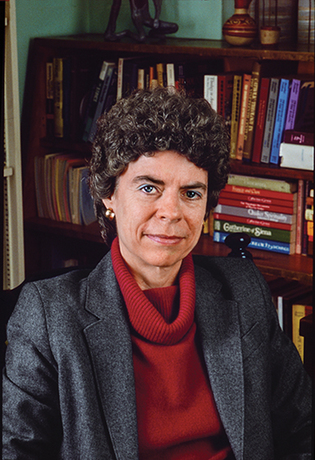
David Ottenstein ’82 for Yale Alumni Magazine, 1986
Margaret Farley
Theologian
Peggy Edersheim Kalb ’86
As a Yale Divinity School student, Sister Margaret Farley ’73PhD—now the Gilbert L. Stark Professor Emerita of Christian Ethics—joined a sit-in demanding that the school add a women’s bathroom to the library. Soon after, she became the first woman hired for a full-time YDS faculty position. In 1984, Farley, a member of the Religious Sisters of Mercy, was a signatory on a statement calling for discussion of abortion; the letter was published in a full-page ad in the New York Times. In 2006, Farley published her best-known book, Just Love: A Framework for Christian Sexual Ethics. Six years later, Just Love was condemned by the Catholic Church as “not consistent with authentic Catholic theology.” The Church Notification specified: “Among the many errors and ambiguities of this book are its positions on masturbation, homosexual acts, homosexual unions, the indissolubility of marriage, and the problem of divorce and remarriage.” Sales of the book surged.
In a statement released at the time, Farley responded that as a theologian, she offers “contemporary interpretations” based on what she hears from people living their lives, not church doctrine. “I often say that the reason I wrote Just Love is because people are suffering,” Farley explained recently. “It might be that the conclusions that we had previously drawn need to be developed. Or maybe even let go of. It would be a contradiction to Roman Catholic frameworks for doing moral theology to say that we can’t develop teachings further.”
“What she realized was that a lot of her students came out of Christian traditions that didn’t have an adequate sexual ethic, a framework to help them discern whether their sexual relationships were just and loving,” says Jamie Manson ’02MDiv, Farley’s research assistant. Kate Ott ’00MAR, an associate professor of Christian ethics at Drew Theological School, says she went to YDS because she loved Farley’s writing—and that it was a Catholic woman’s writing: “She’s very proper, traditional, and congenial, and yet there is this other side of her that is total kick-ass.” Ott says her fondest memories are the green pens. Green was Farley’s color of choice for grading papers because, she said, it was the color of hope. Farley’s classes were “invitational,” Ott adds. “It wasn’t her telling us what to think; it was an invitation to join her in scholarly work.”
Farley is also known for partnering with colleagues. She cofounded the Yale New Haven Hospital bioethics committee. She co-taught courses: bioethics with a med school professor, feminist theology and ethics with Professor Letty Russell (“a class that was always packed,” says Ott). In 2002, as the HIV/AIDS crisis grew in Africa, women in religious orders there appealed for help. Ott worked with Farley to partner with the School of Public Health, USAID, and the Concerned African Women Theologians, and the Sister-to-Sister Project was born. Retired YDS dean Harry Attridge notes that the US women offered the African women “support as they defined their needs for support—rather than saying, ‘This is what you need.’ All this was Margaret’s idea.”
Farley has written or coedited seven books and over a hundred articles and chapters. Her writing is profound, challenging, and instructive in a way that puts self-help books to shame. To close with a Margaret Farley quote: “It is important to struggle for justice and ethical decision-making, but the struggle should never disturb your peace.”
 loading
loading